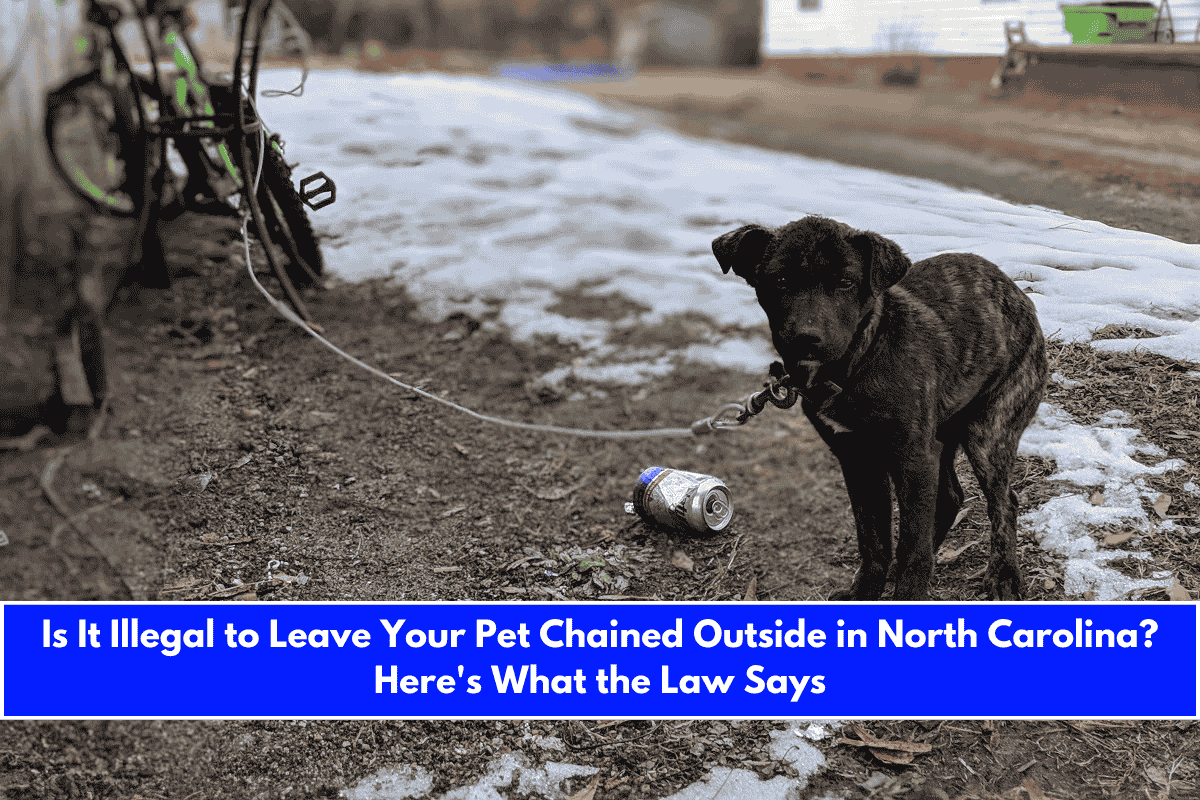The legality of leaving your pet—specifically dogs—chained or tethered outside in North Carolina depends on a combination of state law and local ordinances, which can vary significantly from one city or county to another.
State Law: Cruelty and Malicious Restraint
North Carolina state law (NC GS § 14-362.3) makes it a crime to restrain a dog in a cruel manner. Specifically, it is illegal to maliciously restrain a dog using a chain or wire that is grossly in excess of what’s necessary to restrain the dog safely.
Doing so is a Class 1 misdemeanor. The law defines “maliciously” as intentionally imposing a restraint with bad motive or intent to cause harm.
Key points under state law:
- Using a chain or wire much heavier or longer than necessary, or intended to harm the animal, is illegal.
- General, non-malicious tethering is not outright banned at the state level, but must not be cruel.
Local Ordinances: Stricter Rules in Many Areas
Many North Carolina cities and counties have passed their own, much stricter, tethering laws. Here are some notable examples:
Raleigh
- Dogs may not be tethered for more than three hours total in any 24-hour period.
- The tether must be at least 10 feet long, attached with a buckle collar or harness, and cannot weigh more than 10% of the dog’s body weight.
- The dog must have access to food, water, and shelter.
- Violations can result in a misdemeanor charge and a $100 per day civil penalty45.
Randolph County
- It is unlawful to tether a dog as a regular method of keeping it on the property.
- Tethering is only allowed for short periods (e.g., bathroom breaks, exercise) and never 24 hours a day.
- Specific requirements for tether length, collar type, and access to necessities apply3.
Cumberland County
- No dog may be tethered outdoors unless the owner is outside and within sight of the animal at all times.
- Tethering is only allowed under certain exceptions (e.g., temporary events, emergencies, with permits).
- Tethers must meet specific requirements for length, weight, and safety6.
General Requirements for Tethering (Where Allowed)
- The tether must be long enough (often 10–12 feet minimum).
- The tether cannot weigh more than 10% of the dog’s body weight.
- The dog must have access to food, water, and shelter.
- The collar or harness must be properly fitted and not cause injury.
- Tethering in extreme weather or hazardous conditions is often prohibited.
Penalties
- Violations can result in misdemeanor charges, fines (often $100 per day), and potential seizure of the animal for repeated or egregious offenses.
Bottom Line
- State law prohibits cruel or malicious tethering but does not ban all outdoor chaining.
- Many local ordinances in North Carolina strictly limit or even ban routine tethering of dogs outside.
- Always check your local city or county laws—in many places, leaving your pet chained outside for extended periods is illegal, and even short-term tethering must follow strict rules.
- Tethering that endangers the animal’s health, safety, or welfare is illegal everywhere in North Carolina.
If in doubt, consult your local animal control or municipal code for the most current and specific regulations in your area.
Sources:
- https://www.animallaw.info/topic/table-state-dog-tether-laws
- https://www.peta.org/issues/animal-companion-issues/ordinances/north-carolina/
- https://www.peta.org/issues/animal-companion-issues/ordinances/north-carolina/randolph-county-north-carolina/
- https://raleighnc.gov/safety/services/animal-control/dog-tethering-ordinance-and-leash-law
- https://www.peta.org/issues/animal-companion-issues/ordinances/north-carolina/raleigh-north-carolina/











Leave a Reply